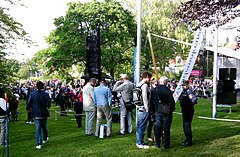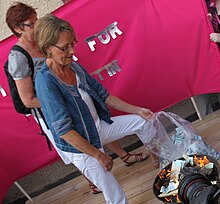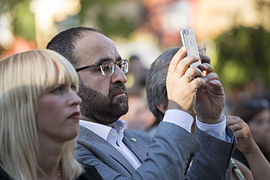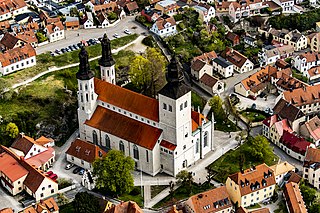
Visby is an urban area in Sweden and the seat of Gotland Municipality in Gotland County on the island of Gotland with 24,330 inhabitants as of 2017. Visby is also the episcopal see for the Diocese of Visby. The Hanseatic city of Visby is arguably the best-preserved medieval city in Scandinavia, and, since 1995, it has been on the UNESCO World Heritage Site list. Among the most notable historical remains are the 3.4 km (2.1 mi) long town wall that encircles the town center, and a number of church ruins. The decline as a Hanseatic city in the Late Middle Ages was the cause for many stone houses being preserved in their original medieval style.

Region Gotland, officially Gotlands kommun, is a municipality that covers the entire island of Gotland in Sweden. The city of Visby is the municipality's seat. Gotland Municipality is the 39th most populous municipality in Sweden.

Gotland, also historically spelled Gottland or Gothland, is Sweden's largest island. It is also a province/county, municipality, and diocese. The province includes the islands of Fårö and Gotska Sandön to the north, as well as the Karlsö Islands to the west. The population is 61,001, of which about 23,600 live in Visby, the main town. Outside Visby, there are minor settlements and a mainly rural population. The island of Gotland and the other areas of the province of Gotland make up less than one percent of Sweden's total land area. The county formed by the archipelago is the second smallest by area and is the least populated in Sweden. In spite of the small size due to its narrow width, the driving distance between the furthermost points of the populated islands is about 170 kilometres (110 mi).
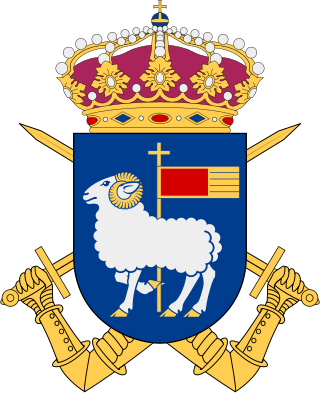
The Gotland Regiment is a Swedish Army armoured regiment which has been active in various forms between 1963–1994 and 2000–2005, when it was disbanded. The regiment was re-established on 1 January 2018. The regiment is based in Visby as part of the Gotland Garrison.
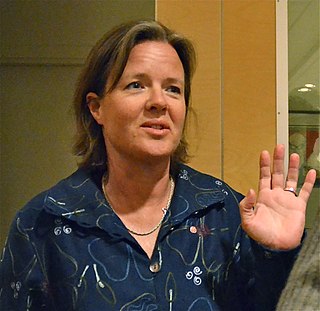
Carin Jämtin is a Swedish civil servant and former politician who has served as Governor of Västernorrland County since 1 September 2023.

Visby Airport, is located about 3.5 kilometres (2.2 mi) north of Visby, Gotland, Sweden.
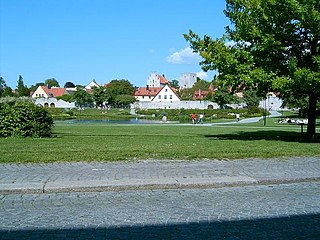
Almedalen is a park in the Swedish city of Visby on the island of Gotland. It is well known in Sweden as the central site of the annual Almedalen Week.

Roma, also by proxy referred to as Romakloster, is a locality on the Swedish island of Gotland, with 936 inhabitants in 2014.

Tommy Möller is a Swedish professor of Political science at Stockholm University, and a frequent conservative political commentator in the Swedish media.

Fole is a populated area, a socken, on the Swedish island of Gotland. It comprises the same area as the administrative Fole District, established on 1 January 2016.

Säpojoggen refers to two annual jogging events in Sweden. One of them is arranged in Stockholm and the other one at the Almedalen park in Visby.

Alexandra "Alice" Teodorescu Måwe is a Romanian-Swedish legal professional with the Företagarna organisation of Swedish entrepreneurs and a liberal-conservative commentator on social and political issues.

The presence of the military on Gotland results from the Swedish island's strategic military importance in the Baltic Sea for most of the nation's history. Gotland has been fortified in stages since the 13th century.

Burs is a populated area, a socken, on the Swedish island of Gotland. It comprises the same area as the administrative Burs District, established on 1 January 2016. As of 2015, Gustaf Edman from Burs was probably Sweden's tallest man.

Per Lodenius is a Swedish politician who was an MP for the Centre Party from 2006 to 2021. He is an educated Swedish teacher, and in the early 1990s, he was self-employed as a freelance dance educator. He was elected to the Center Party in Stockholm County constituency in the 2006 election. He was a substitute member of the education committee from 2006 to 2021 and spokesman on special education issues. From 2011 to 2021, Lodenius was an ordinary member of Parliament's Cultural Affairs Committee and the Center Party's spokesperson on cultural issues.
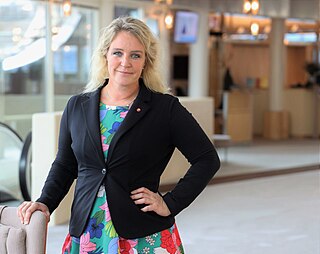
Hanna Carolina Westerén is a Swedish politician and member of the Riksdag for the Swedish Social Democratic Party. She is currently taking up seat number 13 in the Riksdag for the constituency of Gotland County. Since 2018 she has been a member of the Committee on Environment and Agriculture.
Ing-Marie Birgitta Wieselgren was a Swedish psychiatrist and national coordinator for psychiatric issues in Sweden's Municipalities and Regions. She was also chief physician at Uppsala University Hospital.
In the run-up to the next Swedish general election, various organisations carry out opinion polling to gauge voting intention in Sweden. The date range for these opinion polls are from the 2022 Swedish general election, held on 11 September, to the present day. The next election is scheduled for 13 September 2026, but a snap election may be held earlier.
